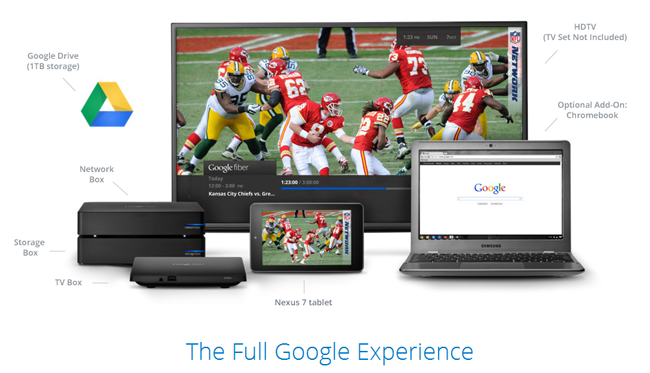By
on

Google Fiber is unveiled. And it sucks to be Time Warner Cable right now. But they already knew that.
Google is offering 3 packages in Kansas City - a gigabit Internet connection for $70/month, a TV + Gigabit Internet connection for $120/month, and a free Internet tier of 5/1Mbps (subject to a one time $300 connect cost). The first two packages also have the $300 connect fee but it is waived with a contract.
The details are available via DSL Reports and The Verge. There are several interesting enticements along with the connectivity.
Plans and pricing is here. I'm surprised at the number of television channels that are available on that package. Notable channels missing include Disney and ESPN, probably because ABC was trying to rake Google over the coals on pricing.
Neighborhoods will be competing to get enough presubscriptions to get connected (at $10 per potential subscriber). It will be interesting to see how this goes - the approach makes sense from a business perspective but could result in a patchwork of neighborhoods lacking access.
 In short, this will be interesting to watch. How will Time Warner Cable respond? How enthusiastic will ordinary people be? Google's marketing talent is considerably more advanced than that of the local governments and small companies (Sonic.net) that first blazed this trail. Speaking of which, I have not yet seen how other service providers will be able to use this network, if at all.
The free 5/1 connection is interesting. For a massive company like Google, providing hundreds or thousands of 5/1 connections essentially has zero cost. This is also true of Comcast and CenturyLink, which is why they are profitable on those $10/month low-income packages.
This is not a Google experiment. Those running this project are expected to earn a profit. How Google chooses to calculate that, we do not know.
Our biggest fear with this project is that we will see communities looking to Google to solve their broadband problems rather than taking responsibility for themselves. Google has done much to improve broadband in the U.S. and should be recognized as helping residents and businesses get beyond the pathetic last-generation broadband connections offered by cable and DSL companies. We hope they succeed but continue to believe that communities are better served by owning their own network.
If I were moving south of Minnesota in the near future, it would be to Chattanooga or Lafayette, not Kansas City. Who knows what Google will be doing in 5 years? We know exactly what EPB and LUS will be doing.
In short, this will be interesting to watch. How will Time Warner Cable respond? How enthusiastic will ordinary people be? Google's marketing talent is considerably more advanced than that of the local governments and small companies (Sonic.net) that first blazed this trail. Speaking of which, I have not yet seen how other service providers will be able to use this network, if at all.
The free 5/1 connection is interesting. For a massive company like Google, providing hundreds or thousands of 5/1 connections essentially has zero cost. This is also true of Comcast and CenturyLink, which is why they are profitable on those $10/month low-income packages.
This is not a Google experiment. Those running this project are expected to earn a profit. How Google chooses to calculate that, we do not know.
Our biggest fear with this project is that we will see communities looking to Google to solve their broadband problems rather than taking responsibility for themselves. Google has done much to improve broadband in the U.S. and should be recognized as helping residents and businesses get beyond the pathetic last-generation broadband connections offered by cable and DSL companies. We hope they succeed but continue to believe that communities are better served by owning their own network.
If I were moving south of Minnesota in the near future, it would be to Chattanooga or Lafayette, not Kansas City. Who knows what Google will be doing in 5 years? We know exactly what EPB and LUS will be doing.
Geoterm







